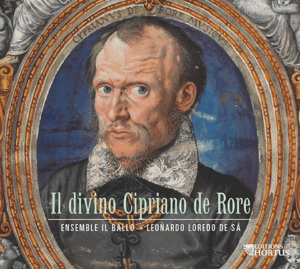
Cipriano de Rore (c.1515-1565)
Il divino Cipriano de Rore
Ensemble il Ballo/Leonardo Loreda de Sá
rec. 2021, Church of St. Benoit-du-Sault, Indre, France
EDITIONS HORTUS 209 [77]
I find this disc’s documentation a challenge, and some may find it a nuisance. The essays, under five headings, are very interesting but only appear in French. The Italian texts are only translated into French. The booklet is also not particularly easy to navigate. But, if one concentrates on the music and the performances, there is much to enjoy and fascinate here.
We read that the intention was to concentrate on de Rore’s first book of madrigals published in Ferrara in 1550. In fact, twelve of the tracks are from that collection, one from the third book and one from the fourth. They are interspersed with works by Adrien Willaert, the first of the great madrigalists in sixteenth-century Italy, and various instrumental pieces.
The other intention was to play with ‘diminutions’, the type of ornamentation musicians were expected to apply in performance. Extracts from Girolamo Della Casa’s Traites de diminution et d’ornemenation published in 1584 served as exemplars. He demonstrated diminutions in twenty-three madrigals including de Rore’s famous Anchor che col partire (which opens the disc). The rich ornamentation, reserved for the upper voice, here was composed by Giovanni Bovicelli, and the lute tablature accompaniment was supplied by Giovanni Paladino.
The essay also points out that ornamentation was often applied to the bass part. The madrigals are accompanied by instruments. The bass line, heard mostly on gambas, sackbuts or a keyboard, is therefore often quite intricate. The instruments also play alone, for example the harpsichord in Rore’s Com’havran fin le dolorose temper. Tutto il di piango is played by a solo lute. We also have two ricercars from Willaert’s 1551 collection Fantasie recercari contrapunti: a tre voci. There is in these pieces some especially beautiful cornetto playing by Benoit Tainturier, but it seems invidious to highlight one player when the instrumental work is all sensitively handled and beautifully phrased.
The group only has one singer, the soprano Véronique Bourin, whose light tone is well balanced and suitably expressive. The remaining seven musicians play violins, cornets and recorders, lutes and a theorbo. Bourin’s remarkable performance of Vergine bella allows us to hear how the ornamented version of Bassani’s madrigal (which one can think of as an example of any madrigal) might have been heard in the late sixteenth century. The same goes for La bella netta ignuda. The singer has a flexible virtuosity that few can successfully achieve. The disc ends with de Rore’s six light-hearted and mostly unadorned madrigals; the title of the set, Alla dolc’ombra de la belle frondi, means “In the sweet shade of the fair fronds”.
If this music and this concept appeal to you, there will be much of interest; just do not think about the documentation.
Gary Higginson
Availability: Editions HortusContents
Cipriano de Rore / Bovicelli (1550-1594) / Giovanni Paladino (fl. c.1550)
Anchor che col partire
Cipriano de Rore
Di virtú, di costume, di valore
Cipriano de Rore / Girolamo Della Casa (d.1601) / Giovanni Bassano (1558-1617)
Signor mio caro
Cipriano de Rore
Carita di Signore
Tutt’il di piango
Era il bel viso suo
Adrien Willaert (c.1490-1562)
Ricerare decimo
Cipriano de Rore
Amor, ben mi credevo
Giovanni Bassano
La Rose
Cipriano de Rore / Orazio Bassani (c.1615)
Vergine bella
Cipriano de Rore
Com’havran fin le dolorose temper
Cipriano de Rore / Girolamo Della Casa
La bella netta ignuda
Marco Dall’Aquilla (1480-1538)
Ricercare
Cipriano de Rore / Giovanni Bassano
Non gemme, non fin’oro
Non è ch’il duol mi scemi
Cipriano de Rore / Girolamo Della Casa
Io canterei d’amor si novamente
Cipriano de Rore / Giovanni Spadi (fl. c.1610)
Amor, ben mi credevo
Adrien Willaert
Recerare setiimo
Cipriano de Rore
Alla dolc’ombra de le belle frondi
Non vidde’l mondo si leggiadri rami
Un Lauro mi deffese’all’hor dal cielo
Pero piu ferm’ogn’hor di tempo’in tempo
Selve sassi campagne fiumi’e poggi
Tanto mi piacque prima’il dolce lume


















